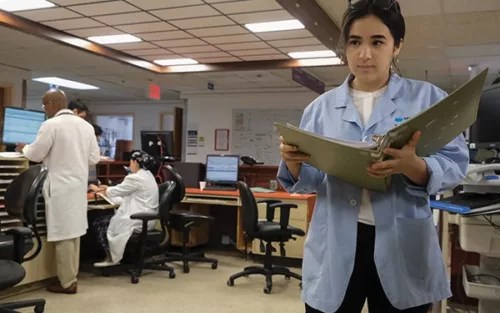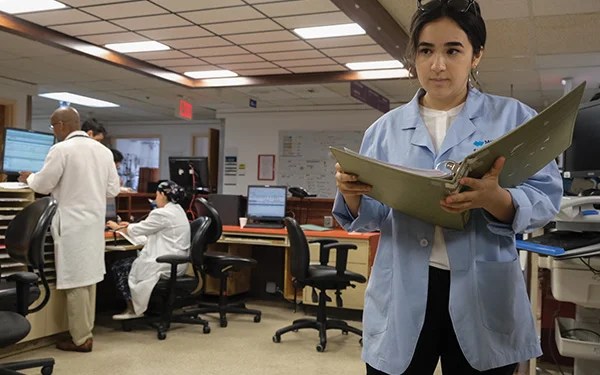
The Youth Mentoring Program (YMP) and WorkForce 2000 (WF2) Program continue to help teenage children of 1199SEIU members boost their academic progress and professional development skills after an unpredictable school year.
In 2021, 194 students completed the YMP, which offers four-week online summer employment opportunities at participating nursing homes and health institutions across New York City. Students build educational and on-the-job competencies throughout the program, helping to prepare them for future healthcare careers.
Twenty-four students were hired as seasonal staff, participating in trainings and regular meetings that updated staff on procedures and best practices.
Students completed health-related projects and presented them at the YMP closing ceremony, held at the end of the summer. Topics included mental health, maternal mortality and teen pregnancy, diabetes and health disparities, looking to the future, students submitted several program proposals for review, including a Junior Internship Program and a YMP Alumni Project.
Our standardized test prep programs remained popular, with strong attendance rates for both the SAT Prep Program and the 2021 Specialized High School Admissions Test (SHSAT) Pilot Program. The SAT Prep Program was split into two sessions, running for 18 weeks on Saturdays during the spring and fall semesters. With specialized workshops covering topics including college essay writing and financial aid, students gained special insight into a wide range of aspects of the college admissions process.
| Throughout the summer, students explored these professional development topics: |
- SAT scores had a baseline average of 1075, while the average practice test score was 1118. Udantha Panditha achieved the highest score of all participants, with a 1570.
- The 2021 program offered a free add-on service to encourage participation and give students additional support with
SAT Prep homework.
|
The SHSAT Pilot Program (sponsored by CCC) prepares eighth- and ninth-grade students for entry into one of New York City’s nine specialized high schools, with programs focused on math, science, language arts and technology. Throughout the semester, students attended admissions workshops, worked through practice materials and learned test-taking strategies to strengthen their skill sets in specialized interest areas as they prepared for the test in December 2021.
Last July, WF2 kicked off summer programming for more than 250 students with four-week virtual programs including the Summer Academic Experience, the Pre-RN program and the new Professional Development Program presented in partnership with YMP.
Summer Academic Experience
Over 150 students completed the Summer Academic Experience
(SAE) offered with our partner site, New York University. Students participated in a variety of classes based on their interests and grade level, along with special workshops on college planning with the City University of New York (CUNY) and the State University of New York (SUNY) systems; wellness and nutritional health with the Benefit Funds’ Wellness Member Assistance Program; and financial literacy.
Pre-RN Program
WF2’s Pre-RN track assists high school students interested in nursing careers by offering programming geared toward acceptance into nursing school. Over the summer, 13 students completed the Pre-RN program and presented summer health projects to fellow students and staff at the Pre-RN Lab Coat Ceremony. Projects focused on physical and mental health issues, such as video games and depression, mental health in school, depression in teenagers, Black maternal health and more.
This winter, 11 Pre-RN students presented group projects at an online health fair on topics including sexually transmitted diseases and sexually transmitted infections, teen mental health, and cancer and its prevalence.
Using the blended-learning approach, the Child Care Funds (CCF) held the 2022 Pre-RN Open House on March 12 via Zoom. WF2 staff and a select group of New York University Metro Center staff reviewed all applications, resumes and teacher recommendations. Twenty-two students applied, and 14 students were accepted into the program.
Professional Development Program
In a special collaboration, YMP and WF2 teamed up to offer the new Professional Development Program for youth eligible for YMP, WF2 and New York City’s Department of Youth & Community Development. Thirty-four students completed the online curriculum, in which they built a professional portfolio that included their resume, cover letter, thank you notes and a capstone project.
| Throughout the summer, students explored these professional development topics: |
- Professionalism
- Prioritizing Responsibility
- Time Management
- Communication Skills
- Multiple Intelligences
- Setting Goals
- Self-Awareness
- College Readiness
|
Summer Youth Employment Program
The WF2 Summer Youth Employment Program (SYEP) offered a six-week hybrid learning experience, with 48 students working both in person and online across 16 healthcare sites, including Maimonides Medical Center, Jamaica Hospital Medical Center, Triboro Center for Rehabilitation and Nursing, and more. As part of a grant from New York City’s Department of Youth & Community Development, the SYEP gives students a glimpse at careers in the healthcare industry by providing paid hands-on experience assisting with patient care, therapies and administrative work.
At the end of the program, select students were offered part-time jobs at their summer placement sites and other students were offered full scholarships to CUNY’s Medgar Evers College.
This year, SYEP accepted 50 WF2 students to participate, contributing to a New York City-wide initiative to provide 100,000 summer jobs.











